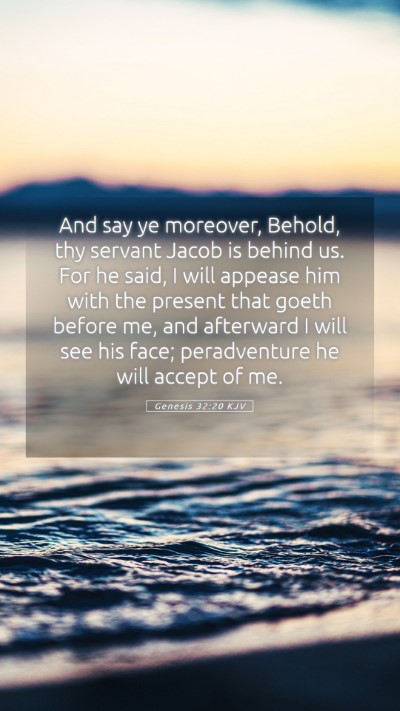Understanding Genesis 32:20
This passage, “And say ye moreover, Behold, thy servant Jacob is behind us: for he said, I will appease him with the present that goeth before me, and afterward I will see his face; peradventure he will accept of me,” is part of a critical moment in Jacob's life as he prepares to confront his brother Esau.
Contextual Overview
Jacob, having fled from Esau due to fear after stealing his birthright, is now returning to his homeland. This verse occurs just before his meeting with Esau, and it reflects Jacob's attempt to seek reconciliation.
Insights from Commentaries
Matthew Henry's Commentary
Matthew Henry elucidates that Jacob's approach is indicative of his cautious nature and deep concern regarding the potential consequences of his initial deceit. Henry emphasizes Jacob’s understanding of the weight of his past actions, as well as his strategic effort to win back Esau's favor through gifts. The act of sending the presents ahead reflects a humility and recognition of his past wrongs.
Albert Barnes' Notes on the Bible
Barnes points out that the phrase "thy servant Jacob" illustrates Jacob's role and attitude of submission as he faces the consequences of his previous behavior. This title signifies a shift from the position of a deceiver to one seeking peace. Barnes also remarks on the phrase “peradventure he will accept of me” indicating Jacob's trepidation; it underscores his uncertainty about Esau's reaction and reflects his reliance on divine mercy for reconciliation.
Adam Clarke's Commentary
Adam Clarke highlights the significance of Jacob sending messengers with a specific message regarding his status. He emphasizes that Jacob admits his weakness and dependence on Esau's goodwill for restoration. Clarke suggests that the presents were not just to appease but also served as a sign of good intentions, showcasing Jacob's desire to mend their fractured relationship.
Application to Life
This passage serves as an important reminder about the principles of humility and reconciliation in relationships. Here are a few points regarding its application:
- Humility in Conflict: Just as Jacob humbled himself before Esau, individuals today can learn the value of approaching conflicts with humility and a willingness to make amends.
- Seeking Forgiveness: The necessity of seeking forgiveness and the steps involved in mending broken relationships are emphasized in this verse.
- Dependence on Divine Grace: Jacob’s uncertainty reflects a truth about our reliance on divine grace for healing and restoration in our relationships.
Related Scripture References
- Genesis 27:34 – The moment Esau discovers Jacob has taken his blessing.
- Genesis 33:4 – Esau's acceptance of Jacob upon their meeting.
- James 4:10 – "Humble yourselves in the sight of the Lord, and he shall lift you up." Here, its relevance to Jacob's humbling moment is clear.
Concluding Thoughts
Genesis 32:20 invites readers to reflect on the importance of humility and reconciliation in their own lives. The verse and the surrounding narrative encourage a deeper understanding of not only conflict resolution but also the grace of God in mending broken relationships.
In summary, this verse exemplifies the complexities of human relationships and the transformative power of humility and reconciliation, which are essential in the pursuit of peace following wrongdoing.


